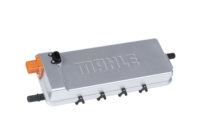Bridgestone and Delta-Energy partner in recovered carbon black project
Bridgestone Americas and material recovery company Delta-Energy have announced the first full-scale use of recovered carbon black (rCB) in the tyre market, according to the two companies.
The move to at-scale commercialization of D-E Black, Delta-Energy’s proprietary rCB product recovered from end-of-life tyres, is a significant milestone in Bridgestone’s long-term environmental vision. The vision targets 100 per cent sustainable materials – and contributing to a reduction of over 50 per cent CO2 emissions – by the year 2050 and beyond. The Delta-Energy materials extraction process produces 81 per cent less CO2 per ton compared to virgin carbon black (vCB), according to Bridgestone.
Bridgestone began evaluating Delta-Energy’s materials in 2007 and became an equity partner in 2014. Since that time, the use of D-E Black as a partial replacement for vCB in new tyres has undergone testing to meet quality, performance and compliance standards.
To date, Bridgestone has purchased approximately 235 metric tons of rCB, the equivalent of more than 70,000 EOL tyres, resulting in the reduction of approximately 765,000 pounds of CO2 emissions, compared to using vCB, it said.
By the end of 2020, Bridgestone plans to increase its use of D-E Black to 6,800 metric tons, equivalent to about 2 million EOL tyres and a reduction of about 24 million pounds of carbon emissions – the amount to power nearly 2,000 homes or more than 2,300 passenger vehicles for a year, according to information from the US EPA.
The company is using the material in agriculture and passenger tyres produced at its Des Moines agriculture tyre plant, Aiken County passenger tyre plant, and the Bridgestone Cuernavaca tyre plant. The company is also assessing new opportunities to expand use of rCB.




Comments